World
Nagorno-Karabakh: MEPs call for EU sanctions on Azerbaijan
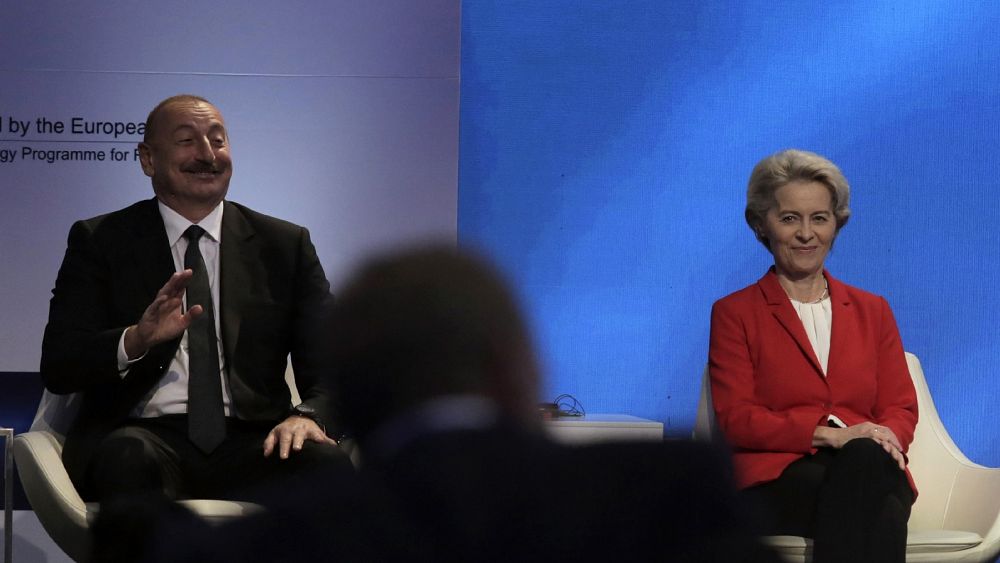
Members of the European Parliament (MEPs) denounced the EU’s inaction in response to the unfolding Nagorno-Karabakh crisis on Wednesday, calling on the bloc to impose economic sanctions on Azerbaijan.
“The EU should act, impose sanctions, including stopping the imports of gas,” Reinhard Bütikofer, German MEP for the Greens group, told Euronews.
On Tuesday, Baku’s foreign ministry launched an “anti-terrorist” operation in Nagorno-Karabakh, the enclave which is largely governed by its ethnic Armenian population, but recognised internationally as part of Azerbaijan.
The attack follows months of brewing tensions over the breakaway region, awakening fears of a return to the hostilities of the 2020 war where thousands lost their lives.
The EU has condemned the aggression but has not introduced any retaliatory measures. The bloc recently signed a new deal to double EU imports of Azeri gas by 2027, with EU Commission chief Ursula von der Leyen calling Baku a “trustworthy” partner.
EU attempts to de-escalate the decades-old conflict between Armenia and Azerbaijan have also been unsuccessful.
In a debate in the European Parliament on Wednesday, MEPs from all political colours claimed the EU has been slow to react to Armenia’s pleas for aid since Azeri forces blockaded the Lachin corridor nine months ago, preventing essential supplies such as food, medicine and fuel from reaching the ethnic Armenian population.
They also called for economic and trade sanctions as well as the suspension of all bilateral relations with Baku.
The debate came hours before the breakaway region accepted a ceasefire proposed by Russian peacekeepers, who have been present in Nagorno-Karabakh since the Moscow-brokered ceasefire in 2020. But Armenian Prime Minister Nikol Pashinyan has recently turned to the West for backing, expressing frustration at the lack of support from Russia.
“We have been unable to prevent an assault that we saw was coming,” Nathalie Loiseau said.
“Mediation has been a total failure. We have never named the aggressor. We have ignored the Armenian prime minister when he called for our help,” she added.
Loiseau also echoed claims made by Armenia’s Pashinyan that Baku is pursuing its policy of ethnic cleansing. “Our weakness and passivity have made us accomplices of this,” she said.
Baku is no ‘trustworthy’ partner
Parliamentarians were also scathingly critical of the EU’s cosy deals with Azeri Premier Ilham Aliyev.
Von der Leyen called Baku a “trustworthy” energy partner in 2022, as she closed a deal to double EU imports of Azeri gas by 2027 in an effort to reduce reliance on Russian energy products.
EU enlargement czar Olivier Várhelyi also met the Azeri foreign affairs minister in Budapest earlier this month to discuss strategic transport and energy projects.
A spokesperson on behalf of the European Commission said on Wednesday that sanctions could only be imposed by the EU’s member states, but that EU leaders would discuss possible measures during the UN General Assembly in New York.
MEPs claimed the EU’s gas bill from Baku was directly funding Azerbaijan’s aggression and campaign of ethnic cleansing.
EU countries imported €15.6 billion in natural gas from Azerbaijan last year, four times more than in 2021. Bulgaria, Romania, Hungary and Slovakia have also pledged to boost gas imports from the oil-rich country.
MEPs also expressed concerns that gas reaching Europe from Azerbaijan was “de facto Russian gas,” and called for urgent investigations into the origin of gas imported through the southern corridor.
A spokesperson for the Commission rejected that claim, telling reporters on Wednesday that “the gas we are receiving from Azerbaijan is Caspian gas.” Asked how they can be sure that the gas did not originate in Russia, the spokesperson said: “It’s just a question of volumes.”
“From the information that we have, the volume of gas which is exported from Russia to Azerbaijan is very significantly smaller than the gas we are importing from Azerbaijan so it’s simply a case of there is not (enough) Russian gas going in on a scale of what we’re importing into Europe.
Geopolitical interests
MEPs also claimed Russia and Azerbaijan have an interest in installing a puppet regime in Armenia as the Kremlin looks to reinforce its influence in the South Caucasus.
“Russia’s goal is clearly to remove Armenian prime minister Pashinyan,” Raphaël Glucksmann, French MEP for the Socialists and Democrats group, said. “They want to get rid of a democratic government in Armenia, which is chosen in freedom and emancipation.”
“How can you hope for the European Union to assert itself as a geopolitical power if we are prepared to sacrifice such important allies as the Armenians in this way?” he asked.
Correction: The headline was amended to correct a typo with the word “now” changed into “not”.

World
Cinematography Work at Camerimage Festival ‘Radically Different,’ Jury Members Say

Jurors at the EnergaCamerimage cinematography fest say the Golden Frog main competition films have been remarkably varied and inspiring in the event’s 32nd edition.
The 12 competing films “were radically different from each other,” said “Barbie” and “Killers of the Flower Moon” cinematographer Rodrigo Prieto, whose directorial debut, “Pedro Paramo,” is also screening at the fest. “I enjoyed that.”
The varied styles, approaches and storytellers, he added, defied easy categorization. “Happily, I didn’t notice trends, which I have noticed sometimes in the past in some festivals.”
Juror Anthony Dod Mantle, who won Golden Frogs in 2008 for his lensing of “Slumdog Millionaire” and in 2016 for “Snowden,” said, “I’ve been to this festival before and the overall collection of films and categories, I felt, was even wider. I feel slight absence of certain films from other ethnic backgrounds. They were different, these films, but they could be far more different.”
Greater diversity and inclusion in cinematography has justly been a hot topic this year at Camerimage, he added. “It’s good we embrace that, celebrate it here, because not many festivals do that.”
Dod Mantle described the current state of cinematography, based on what the jury’s seen this week, as “openly variable and that’s why we praise some films rather than others because they challenge convention.”
He also described the industry as “in a bit of a pickle,” adding, “We know that. We have to applaud ourselves and embrace and encourage every single essence of, molecule of, exploration and challenging cinema.”
Juror Lukasz Zal, who filmed “The Zone of Interest” and “Cold War,” said “I feel really inspired. I feel this kind of positive envy when you just see something which you admire, and love – cinema is still in good condition.”
And, he added, “I’m becoming hopeful that, OK, there’s still a lot to discover. For this, I really love Camerimage. When I was here, when I was a student, I was always coming back home after festival, with this feeling, kind of eager to work, to prepare and to just be really open and be full of ideas.”
Spending time here again as a top professional in his field, Zal said, “I feel again like a student.”
Juror Cate Blanchett said it’s clear cinematography has no crisis of creativity currently.
Instead, there’s a different issue: “The pickle is how one gets access and is able to see these films in the way that they’re intended to be seen.”
Technology advances in the field are also helping storytelling onscreen evolve, she added, rather than distracting from it. “Sometimes you can see there’s been huge technical advances made, or there’s been big innovations, and they haven’t yet been integrated into the stories that they’re being applied to. Whereas I thought there were so many films here that have really integrated the technology and in a completely adventurous and inventive way that was not pretentious. It was very interwoven and enmeshed with the performances and the stories.”
Jury duty at Camerimage is rewarding, said Dod Mantle, because the Golden Frog award can often help promising cinematographers break through to booming careers.
He described the potential effect of the award as “enormous.”
“The first time I came here, in competition,” he recalled, “it illustrated for me the jury was embracing cinema, celebrating something different and challenging.”
Cinematographers are keenly aware of the judgment of their peers, Dod Mantle added. “You feel quite vulnerable here. I’ve seen cinematographers leave the festival and go spend the weekend in Krakow and come back. The frog, ultimately is a beautiful thing celebrating our colleagues’ work.”
Juror Anna Higgs, a producer and columnist who works closely with BAFTA, said, “I think we should normalize cinematographers getting asked for their autographs – the fact that this frog is the idolized thing here.”
Blanchett added, “It’s very rare that you go to a festival where every single person in the auditorium sits right through the credit roll to the very end.” She noted “the respect that is shown to every single crewmember.”
Prieto recalled the impact of his own Golden Frog cinematography win in 2000 for “Amores Perros” fondly. “I do cherish that frog. It’s wonderful to get a frog, but more than anything, it’s a place where cinematography is the focus and is celebrated, and to share that obsession with so many people, and the energy of that, is really wonderful.”
Zal had a similar career boost, he said, after winning for lensing “Ida” by Pawel Pawlikowski in 2013. “That’s really the moment when somehow my career changed. I was always dreaming while having student films here. And it was beautiful to get an award from colleagues and being here and being among amazing cinematographers.
“I was put in competition with the people who I admire. Even now, sitting with Rodrigo, who for me was a huge inspiration. I was shooting my films in school inspired by ‘Amores Perros.’ Now we’re sitting together on the jury. That’s amazing, that’s beautiful.”
Blanchett described the close proximity of students and top international lensers as a unique strength of Camerimage, praising “the mentorship that goes on, how you’ll champion the works of other people.”
“I think that’s why it’s so vitally important that there’s an increased level of female participation. Because of the networking and mentorship opportunities and championing the work. The conversations and the opportunities that arise from those conversations are really important.”
Oscar-winning costume designer Sandy Powell (“Shakespeare in Love,” “The Aviator” and “The Young Victoria”) and cinematographer and documentary filmmaker Jolanta Dylewska also served on the Camerimage jury, calling earlier this week for greater diversity and inclusion in the industry.
World
Ukraine to analyze fragments of missile fired by Russia capable of carrying nuclear warheads
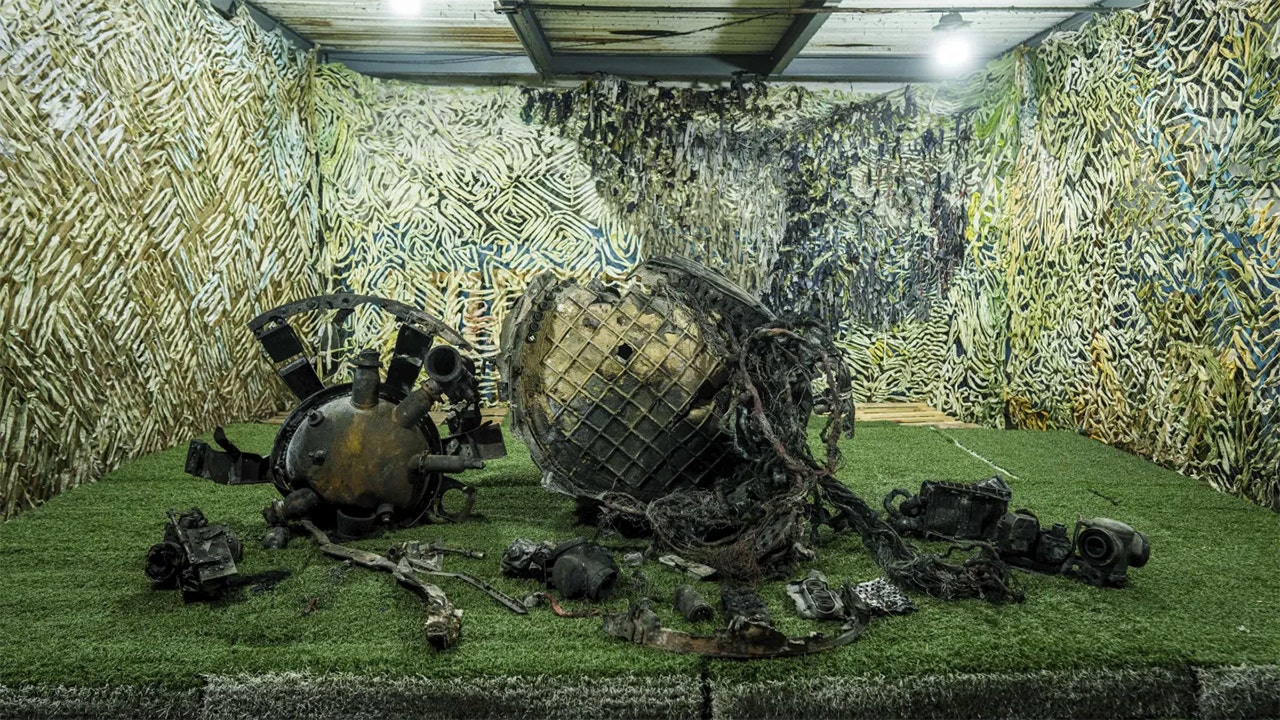
Investigators in Ukraine are analyzing the debris of a new intermediate-range ballistic missile (IRBM) fired by Russia at the city of Dnipro on Thursday, marking the first time the weapon had been used on the battlefield.
On Sunday, Ukraine’s Security Service showed the remaining fragments of the IRBM called Oreshnik – Russian for Hazel Tree – that struck a factory to The Associated Press.
Russian President Vladimir Putin confirmed the attack on Thursday evening in an address to the nation and said it was in direct response to the U.S. and the U.K. jointly approving Ukraine’s use of Western-supplied long-range missiles to target Russia.
The Pentagon has said the missile is based on Russia’s RS-26 Rubezh intercontinental ballistic missile (ICBM), though the wreckage has not yet been analyzed, according to security officials on site in an undisclosed location in Ukraine.
‘NEW’ RUSSIAN MISSILE USED AGAINST UKRAINE NOT HYPERSONIC, DEFENSE OFFICIALS SAY
Fragments of a rocket which struck Dnipro on November 21 are seen at a center for forensic analysis in undisclosed location, Ukraine, Sunday Nov. 24, 2024. (AP Photo/Evgeniy Maloletka)
The AP and other media were permitted to view the fragments before being taken over by investigators.
The wire service showed images of what it described as mangled and charred wires, along with an ashy airframe about the size of a large snow tire. The remains were all that were left of the IRBM, which can carry nuclear or conventional warheads.
“It should be noted that this is the first time that the remains of such a missile have been discovered on the territory of Ukraine,” a specialist with Ukraine’s Security Service said. The specialist only identified himself by his first name Oleh because he was not authorized to discuss the issue with the media.
1,000 DAYS OF WAR IN UKRAINE AS ZELENSKYY DOUBLES DOWN ON AERIAL OPTIONS WITH ATACMS, DRONES AND MISSILES
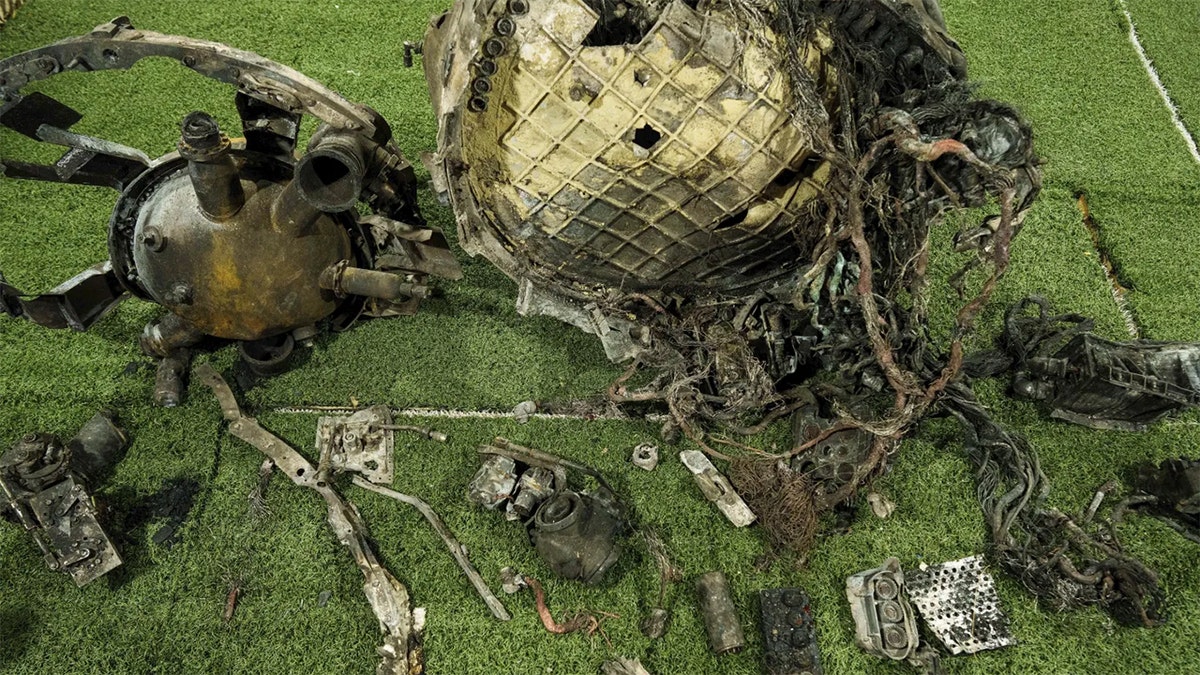
Fragments of a rocket which struck Dnipro on November 21 are seen at a center for forensic analysis in undisclosed location, Ukraine, Sunday Nov. 24, 2024. (AP Photo/Evgeniy Maloletka)
Ukraine’s Main Intelligence Directorate said the missile was launched from the 4th Missile Test Range, Kapustin Yar, in Russia’s Astrakhan region. Once launched, Ukrainian officials said, it flew for 15 minutes before striking Dnipro. The missile was carrying six warheads, each carrying six subunitions, and its speed was Mach 11.
Last week, Deputy Pentagon press secretary Sabrina Singh confirmed to reporters during a press briefing that Russia had launched the IRBM, noting that it was a “new type of lethal capability that was employed on the battlefield.”
She also said the U.S. was notified briefly before the launch through nuclear or risk reduction channels.
US EMBASSY IN KYIV CLOSED AS ‘POTENTIAL SIGNIFICANT AIR ATTACK’ LOOMS
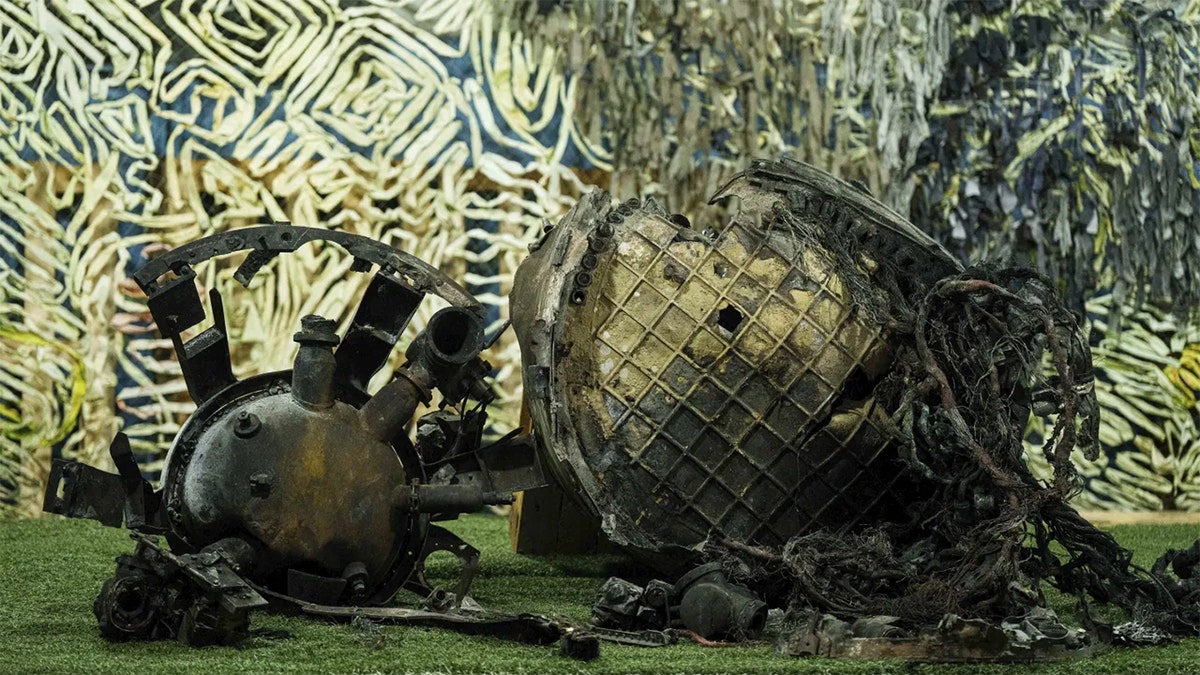
Fragments of a rocket which struck Dnipro on November 21 are seen at a center for forensic analysis in undisclosed location, Ukraine, Sunday Nov. 24, 2024. (AP Photo/Evgeniy Maloletka)
Putin also said last week that the missile attacked targets at a speed of Mach 10.
Despite Ukraine’s and Putin’s claim that the rocket reached speeds greater than Mach 10, two U.S. defense officials told Fox News on Thursday the missile was not hypersonic, which, according to NASA, is a speed greater than 3,000 mph and faster than Mach 5.
Along with launching the IRBM for the first time on the battlefield, Putin signed a law to grant debt forgiveness to those who enlist in Russia’s army to fight in Ukraine.
US BRIEFED UKRAINE AHEAD OF PUTIN’S ‘EXPERIMENTAL INTERMEDIATE-RANGE BALLISTIC’ ATTACK
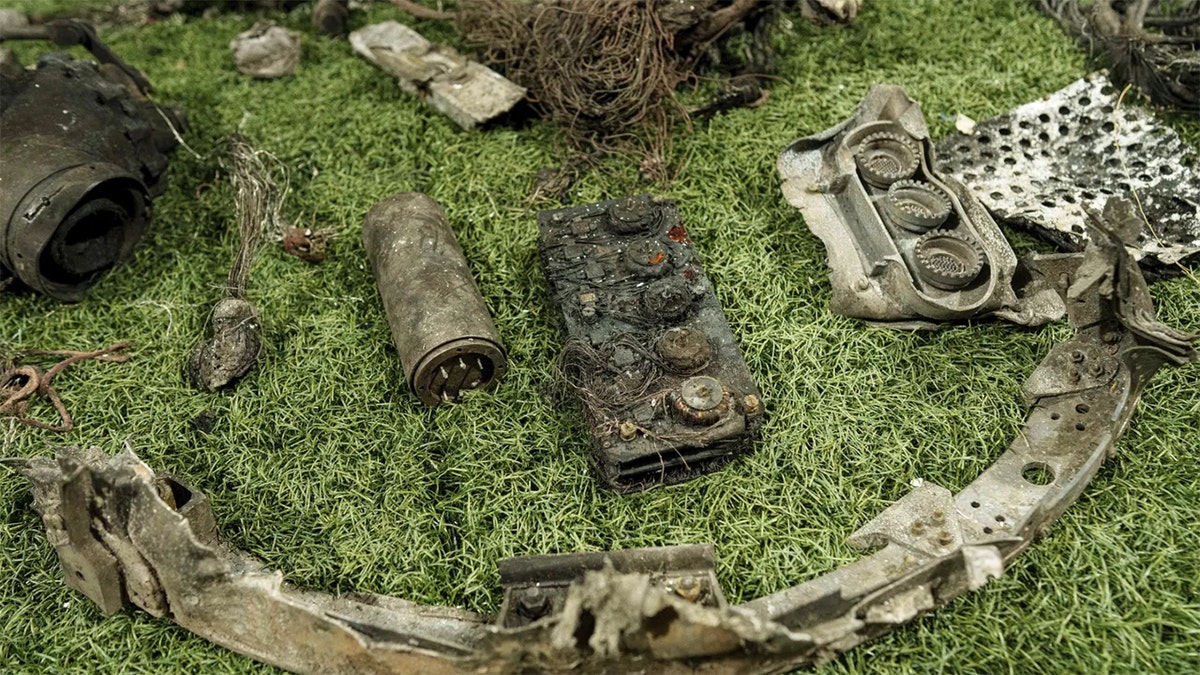
Fragments of a rocket which struck Dnipro on November 21 are seen at a center for forensic analysis in undisclosed location, Ukraine, Sunday Nov. 24, 2024. (AP Photo/Evgeniy Maloletka)
The AP reported that the measure highlights the country’s need for military personnel as it continues its war against Ukraine.
Russian state news agency Interfax said the new legislation allows new recruits enlisting for a one-year contract, to write off debts up to 10 million rubles, or about $96,000.
CLICK TO GET THE FOX NEWS APP
The law reportedly applies to debts in which a court order for collection was issued, and enforcement proceedings had commenced before Dec. 1, 2024. The legislation also applies to spouses of new recruits.
The Associated Press contributed to this report.
World
Voters in Switzerland say no to bigger motorways

The federal government argues that the volume of traffic on the motorway network has increased more than five times over the past sixty years.
Swiss voters took to the polls on Sunday to vote no to bigger motorways, no to easier evictions and tighter subletting rules and yes to a new healthcare financing model.
The Swiss government’s proposal to allocate €5.3 million for expanding motorways and constructing new roads at six key locations, including near Bern and between Geneva and Lausanne, was rejected by 52.7% of voters.
The plan, approved by parliament last year, faced opposition from those concerned about its environmental impact and effectiveness.
The federal government, argues that the volume of traffic on the motorway network has increased more than five times over the past 60 years.
The result was celebrated by the Green Party which called the proposal “an out-of-date transport policy”.
Together with left-wing and environmental groups, the Greens campaigned against the project, highlighting its environmental impact and the concern that wider roads would only lead to more traffic. They now advocate for the funds to be used for public transport, active mobility, and the renovation of existing motorways.
Mattea Meyer from the no camp expressed her satisfaction with the referendum result.
“I am incredibly pleased that a majority of the population does not want a highway expansion, and instead wants more climate protection, a transport transition that is climate-compatible, which the highway expansion is not,” she said.
According to local media to counter this decision the yes campaign, plans on moving forward with expansion projects separately through agglomeration programs, reducing the chance for cantonal referendums.
No to easier evictions
On Sunday, Swiss voters decided on multiple housing issues, such as subletting and lease termination.
53.8% of them rejected the proposal which would make it easier for landlords to terminate leases early in order to use properties for their own purposes.
Additionally, 51.6% voted against a plan for stricter regulations on subletting residential and commercial properties. According to local media, these issues attracted significant attention because tenancy laws affect the majority of Swiss citizens, with about 60% of the population renting their homes, the highest rate in Europe.
The proposal to ease eviction rules faced strong opposition, especially in French-speaking cantons, with Geneva seeing 67.8% of its voters against the plan due to the city’s ongoing housing shortage.
-

 Business1 week ago
Business1 week agoColumn: Molly White's message for journalists going freelance — be ready for the pitfalls
-

 Science5 days ago
Science5 days agoTrump nominates Dr. Oz to head Medicare and Medicaid and help take on 'illness industrial complex'
-

 Politics7 days ago
Politics7 days agoTrump taps FCC member Brendan Carr to lead agency: 'Warrior for Free Speech'
-
/cdn.vox-cdn.com/uploads/chorus_asset/file/25739950/247386_Elon_Musk_Open_AI_CVirginia.jpg)
/cdn.vox-cdn.com/uploads/chorus_asset/file/25739950/247386_Elon_Musk_Open_AI_CVirginia.jpg) Technology6 days ago
Technology6 days agoInside Elon Musk’s messy breakup with OpenAI
-

 Lifestyle1 week ago
Lifestyle1 week agoSome in the U.S. farm industry are alarmed by Trump's embrace of RFK Jr. and tariffs
-

 World7 days ago
World7 days agoProtesters in Slovakia rally against Robert Fico’s populist government
-

 News7 days ago
News7 days agoThey disagree about a lot, but these singers figure out how to stay in harmony
-

 News7 days ago
News7 days agoGaetz-gate: Navigating the President-elect's most baffling Cabinet pick
















